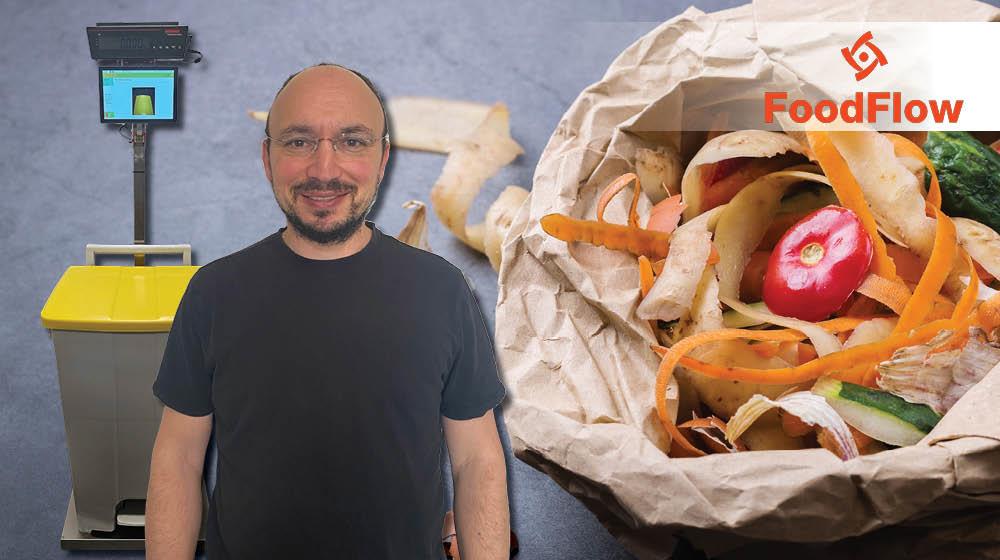Launched in 2023, FoodFlow aims to optimise the hospitality sector’s food waste, enabling them to save money, cut down their carbon footprint and add potential revenue streams.
“The sun-and-sea model adopted by Cyprus’ hospitality sector, which serves some 4 million tourists per year, revolves around all-inclusive packages and buffet-style dining. This model produces the most food waste,” says Panayiotis Philippou, the founder and CEO of FoodFlow. The startup has developed an AI-powered solution to address the food waste problem in the hospitality sector with three simple steps: a digital scale, a camera and a tablet.
In 2011, the United Nations Food and Agriculture Organisation (FAO) released a report titled "Global Food Losses and Food Waste," revealing that approximately one-third of the world's food supply is squandered annually. It added up to a whopping 1.3 billion tons, worth almost one trillion US dollars. To estimate the problem within the context of Cyprus’ hospitality sector, the startup listed 260 hotels and hotel apartments (by number of beds and start rating), and based on data extracted from specific establishments it estimated that the sector's food expenditure is close to €102 million – using the UN model, that suggests some €35 million per year in food waste. However, having surveyed hotel managers, asking the size of the food waste problem, among other things, FoodFlow discovered the vast majority believed it to be under 10% of the total outlay. “We strongly believe that the lack of ways and tools to measure food waste is the biggest contributor to this false conclusion,” Philippou states.
Panayiotis Philippou comes from a traditional business background. His family owned a supply store that didn’t survive the 2013 financial crisis, catalysing his pivot into entrepreneurship. It was a friend in the culinary business who introduced him to the food waste problem endemic to the hospitality sector, and bolstered by the support of another childhood confidant -- a testament to the importance of a robust support network for aspiring entrepreneurs -- himself a researcher at Frederick University, Philippou took the plunge with FoodFlow in 2023.
Receiving €94,000 from the Research and Innovation Foundation’s Pre-Seed Programme, the startup built the prototype in collaboration with Frederick University, Grant Expert Consulting, the Cyprus Chefs Association and the Atlantica Aqua Blue Hotel. Cognizant of the sector’s general aversion to technology, Philippou mentions it was imperative to provide a minimalist solution to encourage adoption. It’s also important to note that FoodFlow only tracks the food preparations and buffet remains – plate leftovers are not actionable. Nonetheless, the startup provides a digital scale, which is placed under a kitchen’s own bin and measures the waste. A strategically positioned camera captures snapshots of the disposed food to tailor the solution to the recipes of each kitchen. Anchoring the ensemble is a tablet, placed under the camera, which displays granular insights, ranging from individual shifts to a full calendar year. According to Philippou, this trove of data can empower staff with pivotal insights into the machinations of their kitchen, pinpointing areas of surplus production, with a possible reduction in waste by a staggering 50% in the first year of implementation. What is more, once food is tracked, hotels can explore options for repurposing it; biofuel production is one such avenue, adding another revenue stream. However, Philippou stresses, that to see real results, hotels need to create a culture wherein kitchen staff do not perceive the solution as an intrusive oversight but rather a paradigm shift towards embracing a data-driven approach in food preparation.
The startup will operate a subscription-based model, which at the preliminary stage will cost hotels €2000 per system per year. “We also decided to take one step further and offer an extraordinary three-month money-back guarantee to our clients. This puts pressure on us to deliver,” he notes. In the first year, FoodFlow has set its sights on capturing at least 10% of the 300 hotels in the local market – Mediterranean countries using a similar sun-and-sea model will follow.
Tailwinds are working in the startup’s favour. By June 2024, the Pay-As-You-Throw project will go live in at least two-thirds of the island, which will tax waste based on weight. Meanwhile, travel agents are now requesting hotels to reign in their carbon footprint, so hotels can use the system to attract environmentally conscious tourists. “Our vision is to become one of the top five players globally and the number one in the Mediterranean,” Philippou says. “And, personally, I also want to help other young people to build their startups because I strongly believe that innovation can help both Cyprus as an economy and young people who need an alternative to employment.”









